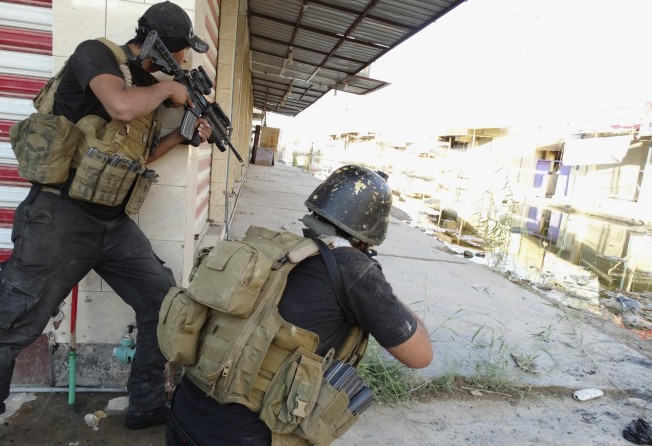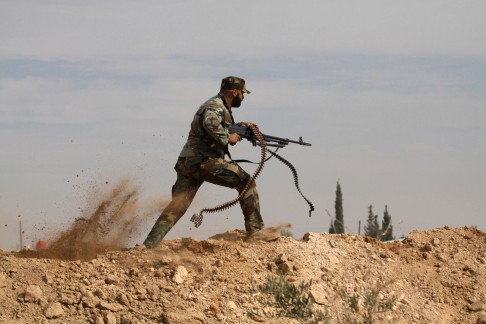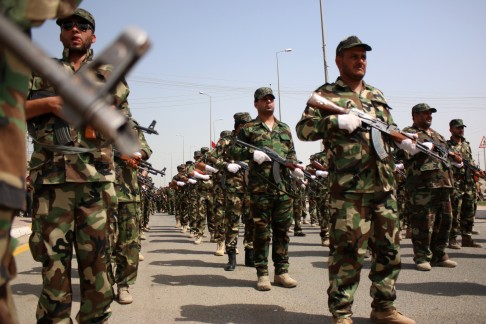
Iraq, Syria conflicts merge into one big battleground
Jihadist victories bolster Assad's claim that he is battling extremists, while he is weakened by the return to Iraq of some of his Shiite fighters

In a reflection of how intertwined the Syria and Iraq conflicts have become, thousands of Shiite Iraqi militiamen helping President Bashar al-Assad crush the Sunni-led uprising against him are returning home, putting a strain on the overstretched Syrian military as it struggles to retain territory recaptured in recent months from rebels.
The borders between the two countries are being largely ignored, with fighters from the Islamic State of Iraq and the Levant (ISIL, also known as ISIS) said to be crossing freely from one side to the other, transporting weapons, equipment and cash in a development that has potential to shift the balance of power in a largely stalemated battle.
The government said its forces had made a "tactical" withdrawal from the towns, control of which has allowed the militants to open up a strategic route to neighbouring Syria, where they also control swathes of countryside along the Euphrates river valley.
Yesterday US President Barack Obama warned the offensive could also destabilise other countries in the volatile region.
"That could spill over into some of our allies like Jordan," he told CBS television's Face the Nation, adding ISIL could "amass more arms, more resources".
The seizure of large chunks of Iraq by militants does offer Assad a messaging victory: he has long insisted that the uprising against him is the work of foreign- inspired Islamist extremists, suggesting that the West needs to work with him to check the influence of jihadis.
The violent actions and speedy successes of the same group in Iraq, against a government the West does essentially support, seem to align with Assad's argument. And he can relish the fact that the US is weighing air strikes against Sunni militants in Iraq - and possibly Syria - while shying away from any military action against his government for the past three years.
But the developments also threaten to upset what has recently been an upward trend by Assad's forces in the three-year-old Syrian conflict.
The Syrian government is heavily reliant on foreign fighters to bolster its ranks and help quell the largely Sunni insurgency engulfing the country. They include thousands of Shiite Hezbollah fighters, Iranian Revolutionary Guard advisers and Iraqi militiamen who left their homes and headed to Syria to defend what they see as an attack on the Shiite regional axis comprised of Iran, Assad, Hezbollah in Lebanon and Prime Minister Nouri al-Maliki's government in Iraq.
That axis is now under mounting pressure. The militants of ISIL are carving out an ever-expanding fiefdom along the Iraqi-Syrian border.
"The developments in Iraq are a double-edged sword for Assad," said Randa Slim, a director at the Washington-based Middle East Institute. "On one hand, these developments help Assad's narrative to his constituents and to the West that his fight is with terrorists and not against democrats." On the other hand, she said, ISIL's rapid and successful incursion into Iraq undermined Assad's claim that he was able to defeat them.
The most immediate consequence is that thousands of Iraqi Shiite militiamen fighting in Syria are heading back home to defend their country against the Sunni blitz, leaving behind gaping holes in areas under their control.
Many Shiite fighters interviewed in Baghdad said they were responding to a call to arms issued in recent days by the country's Shiite spiritual leader, Ali al-Sistani. Others said they considered Iraq to be the mother battle.
"Yes, we took part in the fighting in Syria. But now the priority is Iraq," said Jassem al-Jazaeri, a senior official in Iraq's Hezbollah Brigades, which is believed to be funded and trained by Iran's Revolutionary Guard.
Another concern for Assad is the possibility that ISIL might transfer advanced weapons and vehicles from Iraq across the border into Syria.
A senior Iraqi intelligence offi said the fighters recently seized depots in Mosul containing up to 400,000 pieces of weaponry and ammunition, and that a quarter had been moved to Syria possibly for storage and safeguarding.
Additional reporting by Agence France-Presse

